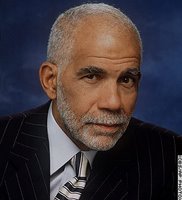
In the immortal words of "The Wolf": "Well, let's not start suckin' each other's dicks quite yet."
In Franklin D. Roosevelt's sixth year in 1938, Democrats lost 71 seats in the House and six in the Senate.
In Dwight Eisenhower's sixth year in 1958, Republicans lost 47 House seats, 13 in the Senate.
In John F. Kennedy/Lyndon Johnson's sixth year, Democrats lost 47 seats in the House and three in the Senate.
In Richard Nixon/Gerald Ford's sixth year in office in 1974, Republicans lost 43 House seats and three Senate seats.
Even America's greatest president, Ronald Reagan, lost five House seats and eight Senate seats in his sixth year in office.
Simply put, the party controlling the White House nearly always loses House seats in midterm elections, especially in the sixth year.
What happened this year is not some grand political reformation with Nancy Pelosi gearing up to post a 95 Thesis on the White House door. This is the natural course of American politics. In fact, historically speaking, the Democrats did not really fare too well during this sixth year. It is only for the dim-witted with absolutely no concept of history is this a "tsunami" (as MSNBC calls it).
However, notwithstanding history, I am sure we are all in for a big circle-jerk about how America has a "new direction" and a "new mandate" from the people. Hey, remember when Bush was elected by a substantial margin how he called that a "mandate" from the people?
I am going to "come out" here. I am, and always have been a Republican, and a Conservative. However, ever since we had control of Executive and Legislative branches, I have noticed that Republicans have lost their sense of purpose and gotten soft.
I am not sure how it happened, but I have a theory.
As you
should be aware, the primary system we currently use (but did not always use) tends to make candidates cast themselves in a more radical light due to the fact that only "hard core" party members really go out of their way to vote in a primary election (e.g. Lamont in Conn.). In this fashion, Republican candidates, assuming the party would always maintain their control of Congress, began to concentrate on themselves, and how to get themselves into power via the primary system. As a result, they started to pander to the "religious right", a voting block that could be depended upon to get out there for a primary election. This, combined with the media's hijacking of the term "Conservative" to mean a person who espouses a government with a religious slant to it, caused the term "Republican-Conservative" to become synonymous with a white, mid-western Christian.
Look, there is absolutely nothing wrong with being white, being from the mid-west or being a Christian, or any combination of the three. However, being perceived as a party comprised solely of such persons will not carry a nation's electorate. It is in this confusion with what is means to be a "Republican Conservative" that caused the party to get "soft."
Simply put, a "Republican" is someone who espouses government functioning at its most influential level at the lowest level possible and respects the text of the Constitution (as it is written). In a nutshell, a Republican believes in the sentiment embodied in the Tenth Amendment of the Constitution which reads:
The powers not delegated to the United States by the Constitution, nor prohibited by it to the States, are reserved for the States respectively, or to the people.
Thus, according to a true Republican, the Federal Government is a Government of enumerated powers, and, any powers not specifically ceded to it via the text of the Constitution is "reserved for the States respectively, or to the people."
This is not too tough.
However, it is the term "Conservative" that has caused a bit of confusion amongst people. And it must be the goal of the party to get a clear message of what this really means.
This is no easy task. R.J. White once said that: "[t]o put conservatism in a bottle with a label is like trying to liquefy the atmosphere. The difficulty arises from the nature of the thing. For conservatism is less a political doctrine than a habit of mind, a mode of feeling, a way of living." Notwithstanding this foreboding warning, I will attempt.
Conservatives believe that any existing value or institution has undergone the correcting influence of past experience and ought to be respected. This is because traditions draw on the wisdom of many generations and the tests of time, while "reason", or any other "goal", may be a mask for the preferences of one man, and, at best, only represents the untested wisdom of one generation. It is important not to get caught up in the nonsense of what a "fiscal conservative" or a "religious conservative" is. These are silly names invented by people who have no idea what it means to be "Conservative."
In sum, when the Conservatives of this nation let themselves be labeled under the rubric of "white, mid-western Christian," by virtue of their willingness to be defined by a certain voting block, they lost the ability to apply the doctrine of Conservative thought: that property rights are to be held in high regard and the best form of government evolves over time, with a respect for that which came before.
In this, they were wrong.
However, with all of that said, I am still not sure what it means to be a "Liberal-Democrat". However, it seems as if I am going to have at least two years of seeing people trying to figure that one out.







